
Henry Wilcoxon was a British-American actor and film producer, born in the British West Indies. He was known as an actor in many of director Cecil B. DeMille's films, also serving as DeMille's associate producer on his later films.

Blood Brothers is a musical with book, lyrics, and music by Willy Russell and produced by Bill Kenwright. The story is a contemporary nature versus nurture plot, revolving around fraternal twins Mickey and Eddie, who were separated at birth, one subsequently being raised in a wealthy family, the other in a poor family. The different environments take the twins to opposite ends of the social spectrum, one becoming a councillor, and the other unemployed and in prison. They both fall in love with the same girl, causing a rift in their friendship and leading to the tragic death of both brothers. Russell says that his work was based on a one-act play that he read as a child "about two babies switched at birth ... it became the seed for Blood Brothers."

Harry Cohn was a co-founder, president, and production director of Columbia Pictures Corporation.
King Brothers Productions was an American film production company, active from 1941 to the late 1960s. It was founded by the Kozinsky brothers, Morris, Frank, and Hyman, who later changed their professional surname to "King". They had notable collaborations with such filmmakers as Philip Yordan and William Castle and are particularly remembered today for employing a number of blacklisted writers during the Red Scare of the late 1940s and 1950s. Their films include Dillinger (1945), Suspense (1946), Gun Crazy (1949), Carnival Story (1954), The Brave One, Gorgo (1961), Captain Sindbad (1963), and Heaven With a Gun (1968).

Final Analysis is a 1992 American neo-noir erotic thriller film directed by Phil Joanou and written by Wesley Strick from a concept by forensic psychiatrist Robert H. Berger. It stars Richard Gere, Kim Basinger, Uma Thurman, Eric Roberts, Keith David, and Paul Guilfoyle. The executive producers were Gere and Maggie Wilde. The film received mixed critical reviews, but was positively compared to the works of Alfred Hitchcock, particularly Vertigo. It was the final film of director of photography Jordan Cronenweth.

Madam Satan or Madame Satan is a 1930 American pre-Code musical comedy film in black and white with Multicolor sequences. It was produced and directed by Cecil B. DeMille and starred Kay Johnson, Reginald Denny, Lillian Roth, and Roland Young.

Fire Down Below is a 1957 adventure drama film with a screenplay written by novelist Irwin Shaw, starring Rita Hayworth, Robert Mitchum and Jack Lemmon, and directed by Robert Parrish. Based on Max Catto's 1954 novel with the same title, the picture was made by Warwick Films on location in Trinidad and Tobago, in Technicolor and CinemaScope, and released by Columbia Pictures.

Joan Elmer Woodbury was an American actress beginning in the 1930s and continuing well into the 1960s.

I Killed That Man is a 1941 American mystery film directed by Phil Rosen and starring Ricardo Cortez, Joan Woodbury and Iris Adrian. Produced by the King Brothers for release by Monogram Pictures, it is a remake of the 1933 film The Devil's Mate which Rosen had also directed.

Confessions of Boston Blackie is a 1941 American mystery crime film directed by Edward Dmytryk and starring Chester Morris, Harriet Hilliard and Richard Lane. A woman consigns a family heirloom to a pair of unscrupulous art dealers in order to raise money to help her sick brother. This film is the second in the series of 14 Columbia Pictures Boston Blackie films, all starring Morris as the reformed crook. It was preceded by Meet Boston Blackie (1941) and followed by Alias Boston Blackie (1942).
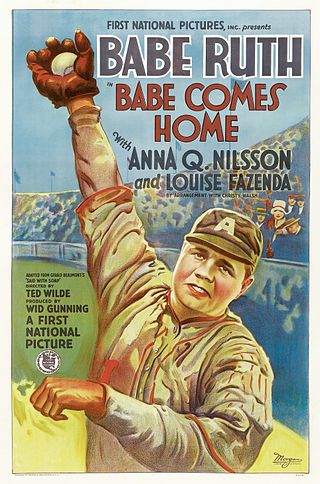
Babe Comes Home is a 1927 American silent sports comedy film produced and distributed through First National and directed by Ted Wilde. The film is a baseball-styled sports film centering on Babe Ruth and Anna Q. Nilsson and was based on the short story "Said With Soap" by Gerald Beaumont.

The Trial of Mary Dugan is a 1929 American pre-Code film produced and distributed by Metro-Goldwyn-Mayer and starring Norma Shearer. The film is based on the 1927 Broadway stage play The Trial of Mary Dugan by Bayard Veiller, who also directed the film. On stage the play had starred Ann Harding, who would come to Hollywood a few years later at the beginning of talkies. This was Veiller's first and only sound film directorial effort as he had directed several silent films before 1922. The play was also published as a novel authored by William Almon Wolff, published in 1928. The 1941 film of the same name is an MGM remake.
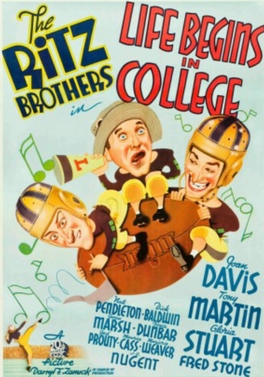
Life Begins in College is a 1937 American comedy film directed by William A. Seiter. It marked the Ritz Brothers' first starring role in a feature film.

The Falcon in San Francisco is a 1945 American crime and mystery film directed by Joseph H. Lewis and stars Tom Conway, Rita Corday and Edward Brophy, who played the recurring role of "Goldie" Locke. The film was the 11th in The Falcon series of detective films, and the eighth featuring Conway as the amateur sleuth. The Falcon in San Francisco was the final film in the series produced by Maurice Geraghty, after which budgets were reduced and location shooting largely abandoned.

The Splendid Crime is a 1926 American crime drama film directed by William C. deMille and starring Bebe Daniels. Famous Players–Lasky produced and Paramount Pictures distributed.
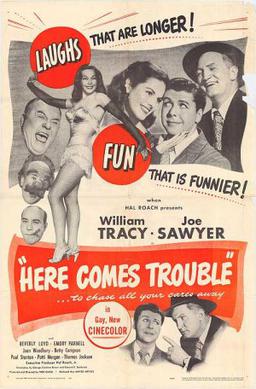
Here Comes Trouble is a 1948 American comedy film in the Hal Roach's Streamliners series. It was produced and directed by Fred Guiol and written by George Carleton Brown and Edward E. Seabrook. The film stars William Tracy, Joe Sawyer, Emory Parnell, Betty Compson and Joan Woodbury. It was released on March 15, 1948 by United Artists.

The Trial of Mary Dugan is a 1941 American drama thriller film directed by Norman Z. McLeod and starring Laraine Day, Robert Young, Tom Conway, Frieda Inescort, John Litel and Marsha Hunt. The screenplay was written by Bayard Veiller based on his 1927 play of the same name. It had previously been made as a 1929 MGM movie starring Norma Shearer in her first all-talking role. There are significant differences in the two movie versions. The 1941 remake was released on February 14, 1941, by Metro-Goldwyn-Mayer.
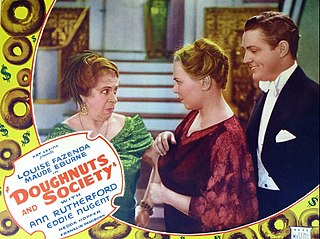
Doughnuts and Society is a 1936 American comedy film directed by Lewis D. Collins and written by Karen DeWolf, Robert St. Claire, Wallace MacDonald, Matt Brooks and Gertrude Orr. The film stars Louise Fazenda, Maude Eburne, Ann Rutherford, Edward Nugent, Hedda Hopper and Franklin Pangborn. The film was released on March 27, 1936, by Republic Pictures.
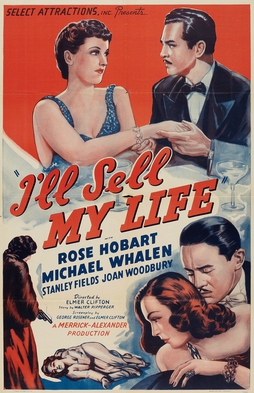
I'll Sell My Life is a 1941 American crime film directed by Elmer Clifton and starring Rose Hobart, Michael Whalen and Joan Woodbury. The film was based on the Street & Smith I'll Buy Your Life by Walter Ripperger.
















